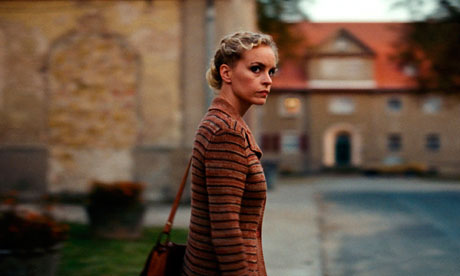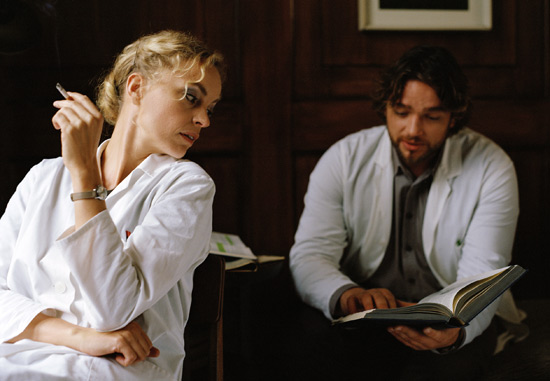
Set in 1980s East Germany, Barbara (which is in theaters on Dec. 21) tells the story of a doctor (Nina Hoss), who is caught applying for an exit visa from the GDR. As punishment, she is sent to work at an ill-equipped hospital in the rural countryside, where she is at the mercy of the Stasi. As she makes plans to escape with her lover to the West, she finds herself drawn to a charismatic and likeminded doctor (Ronald Zehrfeld). Her newfound attraction and growing relationships with her patients lead her to question her decision to flee.
Hoss talked about portraying Barbara's internal conflict, drawing from old fashioned love stories, and the painful truths of living in a Cold War-era Germany.

Barbara marks your fifth time working with director Christian Petzold. How did the two of you approach this film versus your previous collaborations?
What is so nice about working with Christian is that he knows exactly what he wants to do. The descriptions are very well-written and it's full of metaphors, which opens your imagination so that you can find your own way of expressing his words. He doesn't tell you what to think, he just gives you an idea. So you're very open when you enter the rehearsal process, but you also know the story you want to tell and how. Then you work with your scene partner -- and they have their own imagination. You have the time to explore and come to the core of how we want to show certain emotions.

What did watching old romances like To Have and Have Not allow you to bring to your performance?
It didn't have anything to do with copying. It was just to get inspired, and watching [certain films] together, you get in the same zone.
With Barbara and Andre, they may be talking about usual things and political issues, but underneath there's a flirtation. Barbara tests him all the time. He always knows the right thing to say in each moment and doesn't fall apart because of her provocation. That's why she's attracted to him.
It's the same in To Have and Have Not with Lauren Bacall and Humphrey Bogart, they tease each other all the time. They're not really nice to each other, but you immediately feel the attraction. That's why we watched it. To get a feeling from it of how brave you can be.
You can be harsh in one moment and soft in the next. With Klute, there's this one scene where Donald Sutherland and Jane Fonda are finally a couple, and he goes out with her to shop for food and she's standing back and watching him while he smells the melon and chooses the right food for their dinner. It's a very sensual act, and without having a love scene in which they say "I love you," she's showing him.
It's the same in Barbara when he cooks for her. You can tell that he does that when she's not in the room and that's attractive. He can create his island in this terrible state and that's nothing she ever expected.
What did you learn about the history of your own country while researching for Barbara?
There was an actress in the film who lived through that time. That, specifically, helped me a lot.
There's this moment where Barbara has to lie to Andre. It's the moment where he wants her to be part of this specific operation with the young man and she keeps trying to get out of it because she knows she won't be there. Because I never experienced it, I didn't know that in the moment of that lie, your internal [self] dies. She said that it was hot and cold at the same time because she left those she knew and cared for with a lie, but that she had to go through with it or otherwise she couldn't leave her country. This inner turmoil happened so much with Barbara in that moment. As the audience, you must see that it's in her [to deceive], but it can't be too obvious because you need to believe that he doesn't see it.
How did using a real hospital that was furnished before you arrived on set affect your performance?
The hospital wasn't actually a studio. Every morning we actually entered the hospital, so we didn't have to pretend that it was our place of work because it was our place of work. That helps so much when you're trying to let go and fall into the character. Every glass, every table... even the cigarettes were from the time period in the film.
Initially, Barbara intends to escape, but eventually she comes to accept the world that she's been forced to be a part of. At what point do you think she starts to question her plan?
First of all, she has this offensive wall built up, because she doesn't want to be hurt anymore and because she knows she may be leaving -- she is able to endure it more because she knows it's not going to last forever. She's so passionate about her profession. When she meets patients, she's so empathetic and in her new work environment, she meets someone who's as passionate as she is.
She doesn't know if she can trust him or if she can let her guard down.
A turning point is when her lover from the West tells her that she doesn't need to work anymore because he's going to earn enough money.
Women in the East always worked, so that's the first time that she questions her dream of being free.
She wonders whether she'll be in another kind of prison. Will she need to do her exam again? Will she be able to pursue her career and what she's passionate about?
The longer it goes on with Andre, the longer she sees the possibility of having a partner and being with someone who makes a living while keeping his dignity in a place that she didn't think it was possible to live in. She starts to realize that there may be a way to endure the circumstances.
I think at some point she feels responsible for the people there. So it's a question of "Do I leave it all behind?" or "Am I strong enough to make a difference?"
Had loads of people not confronted that question, the wall would never have come down.
Barbara offers a rare portrayal of Cold War-era Germany. Films focusing on that portion of the country's history tend to show a stark grey atmosphere. In this film, we see the beauty of the countryside and how people were able to appreciate art and music.
I think people were really surprised by the vibrant colors that Christian chose. I think it was something new. Especially because we're portraying the Eastern part -- which is always portrayed with a gray filter. It's always grim and depressing. While the region does have that, this film captures the subtlety -- which is dangerous because it creeps into every corner of your private life. Nevertheless, we wanted to be respectful with the story we were telling because (those who lived there) felt love, had children and made a living for 40 years, which is not in vain.
While the film acknowledges that it's good that the practices carried out then are gone, it takes a kind and respectful look at it.
In your opinion, how has Germany found it's way back from the period of history illustrated in the film?
It's a very weird situation to have a country split up into two parts and operating on two different political systems, but on the other hand we all speak the same language and have the same roots. Because of that, we were able to help each other very quickly. Now I think that by having a generation that never experienced to GDR, that changes things because no one wants to dwell on the past. They want to look forward.
Photos courtesy of Adopt Films.